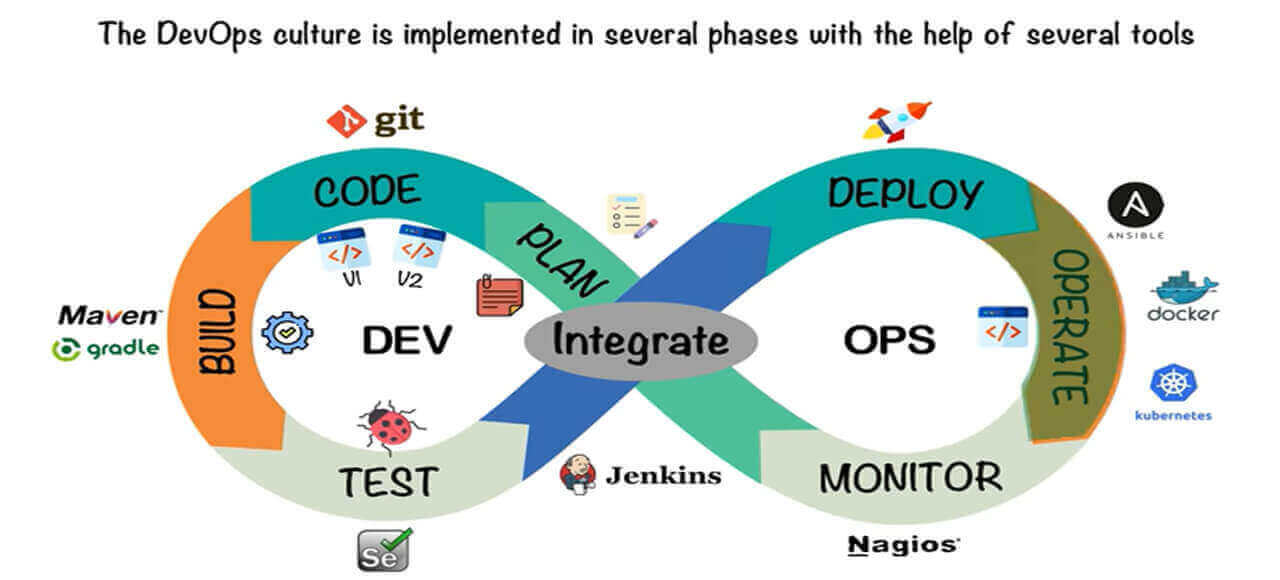DevOps is a combination of development and operations. It is the practice of working together to ensure the quality and stability of software systems.
DevOps is used in organizations of all sizes to improve the quality and efficiency of their software development and operations processes.
DevOps is used to improve the quality and stability of software systems.
One of the benefits of using DevOps is that it can help to speed up the development process.
By working together, developers and operators can share knowledge and work together to improve the quality and stability of the software. This can lead to a more efficient and reliable system.
Table of Contents
ToggleWhat is DevOps?
DevOps is a term that refers to the practice of integrating software development and IT operations into a cohesive process.
DevOps is seen as a way to speed up the development process and improve the reliability and performance of applications.
DevOps is a two-way street. IT operations must be able to rapidly deploy new applications and update old ones, while the developers must be able to work quickly and efficiently on new code.
The goal is to have a process where all stakeholders are working together as a team to create high-quality applications.
How does DevOps works?
DevOps is a culture, process, and toolset for developing, deploying, and managing software applications in a collaborative environment.
It is an umbrella term that groups several related practices, including continuous delivery, automated testing, and software quality assurance.
DevOps has helped organizations achieve faster application releases, improved customer satisfaction, and increased agility. It has also helped to reduce the time required to develop, deploy, and manage software applications.
Evolution of DevOps
In the early days of software development, it was common for teams to work in isolation, with developers writing code in a vacuum and operators managing servers and applications in a separate compartment. With the advent of modern DevOps practices, this has changed.
DevOps is a process and culture that combines the disciplines of software development, operations, and IT management. DevOps is intended to improve the quality, responsiveness, and agility of software systems.
The origins of DevOps can be traced back to the early days of the internet. As the internet became more widespread, it became clear that traditional methods of software development and operations were not working well together.
Benefits of DevOps
There’s a number of benefits of DevOps. Some of them are;
- Predictability: It gives significantly lower failure rate for new releases.
- Maintainability: DevOps enables effortless recovery in the event of a new release crashing or disabling the app.
- Reproducibility: The code enables earlier versions to be restored as needed.
- Higher quality: Incorporating infrastructure issues can improve application development quality.
- Time to market: Streamlined software delivery reduces time to market by by a significant percentages.
- Reduced risk: Incorporating security in software lifecycle reduces defects across its lifecycle.
- Cost-efficiency: Cost-efficiency in software development pleases senior management.
- Resiliency: Software system is more stable, secure, and changes are auditable.
DevOps is a term used to describe a collaborative process that integrates development and operations.
The goal of DevOps is to create a streamlined and automated process that allows for faster and more efficient software development.
One of the major benefits of DevOps is that it can improve communication between development and operations teams. This can lead to faster and more efficient deployment processes, as well as improved accuracy and quality of software.
Additionally, DevOps can help to reduce the amount of time spent on manual tasks, which can free up resources to focus on more important tasks.
Challenges of DevOps
DevOps is a term that is often used to describe the process of integrating software development and IT operations.
It is a process that aims to improve the agility, reliability, and speed of software development by automating and streamlining the deployment process. In order to achieve these goals, DevOps teams must face several challenges.
One of the most important challenges facing DevOps teams is the need to integrate different areas of the organization.
Developers and IT professionals must work together to create and deploy software, while ensuring that the software meets the needs of the end users. DevOps teams must also ensure that the software is maintained and updated as changes are made.
List of DevOps tools
- For plan: kanboard, Wekan, GitLab, Tuleap, Redmine etc.
- For code: Git, Bugzilla, Gerrit, Jenkins etc.
- For build: Gradle, Apache Ant, Apache Maven etc.
- For test: Cucumber, Selenium, Apachi JMeter, JUnit etc.
- For release & deploy: Nomad, Kubernetes, Jenkins, Zuul, Ansible, etcd, Netflix Archaius etc.
- For monitoring: Prometheus, Grafana, Nagios, Fluentd, InflusDB etc.
Goals of DevOps
One of the goals of DevOps is to increase the efficiency of the software development process.
This can be done by reducing the time it takes to deploy new code, improving communication between developers and operators, and automating tasks that can be done more efficiently.
In addition, DevOps aims to increase the reliability and quality of the software deployed by ensuring that all the code is tested and that any changes are properly tested and verified before being deployed.
What is DevOps engineer?
A DevOps engineer is responsible for the overall smooth running of a software development or IT department. They work with developers to automate processes and keep the software development pipeline moving.
They also liaise with other departments within the company, such as marketing and sales, to make sure all the pieces of the software development puzzle fit together.
DevOps engineers typically have a degree in computer science or engineering. They often have experience working as system administrators or developers, and they are comfortable working with a variety of programming languages and tools.
They must be able to think critically and solve problems, as well as be able to work well as a team.
Conclusion
DevOps is an umbrella term that describes a process and culture of working together across an organization to deliver software and systems reliably and predictably.
DevOps is an umbrella term that describes a process and culture of working together across an organization to deliver software and systems reliably and predictably.
The goal of DevOps is to enable agility, improve quality and speed up the delivery of new features and applications. DevOps is not a technology, it is a culture and process.
DevOps is a process that helps teams work together efficiently to deliver software and systems. DevOps is a process that helps teams work together efficiently to deliver software and systems.
Do you think the DevOps in one of the best trending technologies in this present world? Its time to share your opinion through the comment section bellow.




